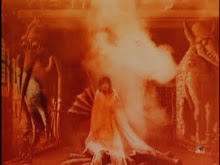TWO FRIENDSHIP POEMS FROM THE CAROLINGIAN RENAISSANCE
The following two poems were written during the 9th century. Drepanius Florus was the deacon at Lyons ca. 850 CE, and participated in the attacks on the brilliantly heterodox works of Johannes Scotus Eriugena. Little is otherwise known of his life. The life and career of Hrabanus Maurus (c. 780 - 4 February 856 CE), author of the second poem is better documented. Maurus was the archbishop of Mainz (in Germany) and one of the most prominent writers and theologians of his age. His work has been regarded by posterity as erudite rather than original.
Both of the poems were composed in the ambience of the cloister - not surprisingly, they have homoerotic overtones (particularly Drepanius Florus' piece) which make them charming to the modern reader. Copyright is owned by Darius Matthias Klein.
Drepanius Florus “From Drepanius to his Friend: an expression of gratitude for his defense”
How sweet is the fragrance emanating from the inner court of your heart, my brother in Christ, you who are powerful in love. The senses are caressed, my entire being is delighted, while your heavenly power gives pleasure to every mind. Not thusly does the vine burn with love under the springtime sky, even as it sends forth its shoots, bright with renown; nor does the fresh grace of the fields in like manner give off so sweet an aroma, as they pour forth their white lilies and pink roses all at once. By you also are the flower-bearing gifts of the forests conquered. All of the scents of the offspring of the fruit-bearing trees are surpassed. You love equally, whether present or absent; nor does your pure mind ever know such self-serving deception that you would treat you foes differently from your dearest companions. Your heart caresses us, your tongue sings of us. To your friends you bring what pleases, while to those inimical you use reason to make refutations. One love shines with diverse arms, and because True Love, the conqueress, always prevails, it shall bear its glorious victories into eternity. Darksome ruin inevitably comes in a headlong whirlwind to hatred and malignant words and deeds. But sincere love, which it light eternal, shines; nor does it yield to darkness. Rather, darkness flees from it. Why? Is it because you never neglect to speak pious and restorative words, ladening them with many gifts, both here and in your home? This is true love, this is pure affection, which throughout the world is the holy reward given by both the Father and Christ. The Spirit which flows in the heavenly realms diffuses such gifts in the minds of the pure. Now the words of the ancient man [? = reference unclear], who, having been taken by the light and being of serene mind, gives us pleasure as they declare: Thus now is my child as redolent as the renowned countryside, which makes manifest the blessed rewards of the Divine One. May the Almighty give you the health-restoring dew of Heaven and sufficiently generous rewards for your fertile fields, the illustrious treasures of one who shall be a brother for all time. With the utmost delight do I dispense both oil and the finest of wines, rendering them unto you, dear advocate, as goodly promises of perpetual gratitude. For it is befitting to sing of divine gifts with divine words, so that like is returned directly with like in a beautiful exchange. May you be blessed, retaining a love begun in the world and taken by Heaven into eternity, friend of God.
http://http//www.documentacatholicaomnia.eu/02m/0300-0400,_Drepanius_Florus,_Psalmi_Et_Hymni,_MLT.pdf
Hrabanus Maurus “Poem written to a Friend”
Greetings, faithful love and blessed delight: greetings, and remain blessed in the world, you who are our counselor, the mere mention of whose name brings good fortune. The verses I compose about you are better than those of Vergil, better than those of the heavenly Ovid, superior even to the odes of Horace: better than he who was more copious of words than Homer, whom Cordova engendered and Africa held [Lucan?]. For indeed had these poets, rightly suffering from the bites of envy, produced falsities with the bombastic Camoeans [? = reference unclear]. Knowing cordial hearts, you peacefully declaim devoted chains woven from pious words and make loving hearts known. I ask you this: what does our love do? I ask with verses, I beseech, that ardent passion go always with our writings. Let noble speech make celebration, let words reflect the rule [i.e., the monastic rule] – and let words certainty, joined by art, go forth in these verses. Let your stylus be embellished with worthy song, and the poet be praised by means of goodly law. May Christ Who is God in His citadel, pious Ruler of the World, give unto you the utterance borne of the Father, using the highest power of speech. And may His Spirit render hearts to be well disposed toward you, that you please the Lord in thought and word. For He directly compelled me to write these words to you in haste, wise wayfarer. May you always prosper.
http://http//www.documentacatholicaomnia.eu/02m/0788-0856,_Rabanus_Maurus,_Carmina_De_Diversis,_MLT.pdf
http://http//en.wikipedia.org/wiki/Rabanus_Maurus
Monday, February 16, 2009
Subscribe to:
Comments (Atom)
